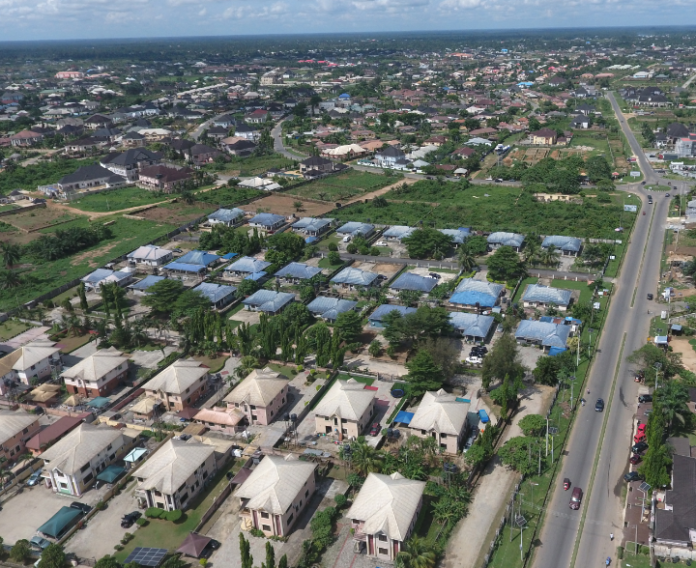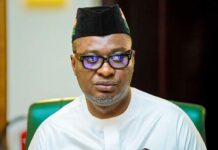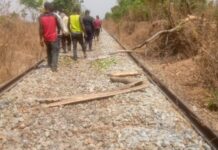Aerial view of some houses in Akwa Ibom State. (Credit: AKWAGIS)
Abasifreke Effiong
The Akwa Ibom state government has met the baseline requirements set by the world bank for property taxation. The state has gone ahead putting up structures for its planned reintroduction of property tax after the first attempt at introducing property charge in 2017 failed.
This report which aims to raise public awareness on the state government’s plan to reintroduce property tax, takes a cursory look at the development-linked indicators (DLIs) the state has met ahead of the plan to reintroduce property tax between 2023 – 2025. The report has identified the reasons for the failure of the first attempt at introducing the tax, and discusses property tax vis-à-vis the state’s medium term expenditure framework and IGR, and what the state should do to rake in enough public buy-in ahead of the reintroduction of the tax.
▪ World Bank’s SFTAS template for property taxation
The world bank through its incentivised fiscal policy reformation programme called States’ Fiscal Transparency, Accountability and Sustainability (SFTAS), in down-line item 5 (DLI 5) sets out the foundational guidelines for state property taxation. For introduction of property tax, the guideline stipulates that participating states in the SFTAS programme must have an electronic database of property records of at least 50% of property that have electricity connection in urban centers in the state. Each property in the database must have the following minimum information: name of owner/occupier, size of the land parcel, size of the building, use of property, location geo-tag and description of type of building construction – wall and roof or photograph of the property.
▪ AKWAGIS
The baseline requirements on property taxation set by the world bank prompted the state government in 2021 to launch what is called Akwa Ibom Geographic Information Systems, AKWAGIS, to carry out aerial and satellite survey, enumeration of houses, documentation and creation of digital data bank for landed property in the state. At the project launch in Uyo on October 15, 2021, the project consultant, Mr. Frank Ekpenyong, said AKWAGIS is to ensure automation of land processes.
 Mr. Udom Emmanuel, Governor, Akwa Ibom State.
Mr. Udom Emmanuel, Governor, Akwa Ibom State.
Through AKWAGIS, the state has successfully built a digital data bank of property. The commissioner for lands and water resources in the state, Mr. Iniobong Ekong, whose ministry is supervising the project, said the state has met the world bank baseline requirements for property taxation.
“Akwa Ibom state is the oly state in Nigeria that went 80 percent above the benchmark of what the world bank gave. The world bank gave us a target of about 50,000 houses, we have met 97,000 in conformity and beyond the expectation of the world bank. The 50,000 houses are 100 per cent requirement and we met 97,000 spread across Uyo, Ikot Ekpene, Eket, and Ikot Abasi.”
The commissioner said every town, community, hamlet in the state is on the property data bank and can be accessed by a click on the button. “We have been able to capture every detail that is required and possible for land ownership, land acquisition, land commercialization and land investment. We have been able to know by the click of a button the land that is developed, the land that is available for development, the land that is occupied and the type, kind of structure that is occupying that piece of land.”
“Whatever you want to know about Akwa Ibom, be it land availability, be it land acquisition, be it investment, be it residential areas, commercial, industrial, investibles and non-investibles, the moment you hook on to the website of AKWAGIS, you will get that information”, Mr. Ekong added.
AKWAGIS platform offers four broad services viz; property search, online application, online payment, and visualisation of progress on different stages of land application. Now, anyone can apply for power of attorney, deeds, caveat, C-of-O, letter of transfer, survey, approvals by Uyo Capital City Development Authority (UCCDA) from the comfort of his/her house.
Even though the Commissioner for Finance, Mr. Linus Nkan, had argued at the launch of AKWAGIS in 2021 that the essence of the project was not to bring back property tax in the short term, however, meeting the world bank’s baseline requirement for property taxation has given the state impetus to propose the reintroduction of property tax. The state government has in its Medium Term Expenditure Framework (MTEF) 2023-2025 submitted to the House of Assembly in July 2022 proposed the reintroduction of property tax as one of its projected revenue subheads. The 103-pages MTEF document has seven broad indicative targets, which include, curtailing fiscal deficit – GDP ratio to 3.0 percent, increasing revenue – GDP ratio to 20% in 2025, reduction of debt and achieving primary surplus by 2025.
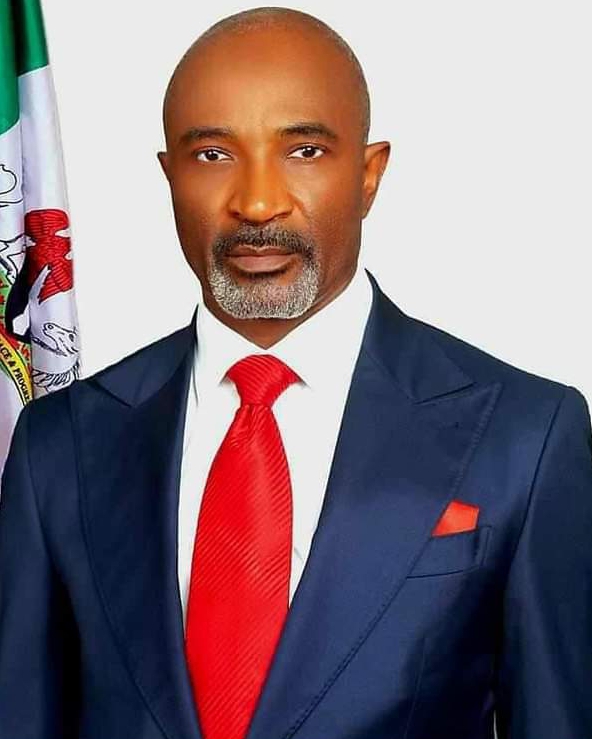 Mr. Iniobong Ekong, Hon. Commissioner for Lands and Water Resources, Akwa Ibom State.
Mr. Iniobong Ekong, Hon. Commissioner for Lands and Water Resources, Akwa Ibom State.
▪ Revenue realities vs MTEF 2023 -2025
The ambitious medium term economic plan of the state as elucidated in the MTEF would be impossible with the current revenue profile. The state’s statutory earnings from the federation account (comprising statutory allocation, 13 derivation, and excess crude) have been unpredictable, unreliable and sometimes dipping to a frustrating low, like it dipped to N95.75 billion in 2016 from N148.84 billion in the preceding year.
The nation’s economic projection shows clearly that instead of an increase, statutory allocations to states will continue to incline downward in 2023. The federal government has benchmarked crude oil production at 1.69 mb/d in the 2023 budget against the 1.88 mb/d benchmark in 2022, representing a 10.1 percent decrease in projected production. The production benchmark for next year is already lower than Akwa Ibom’s 1.9 mb/d projection for 2023 used as the basis for preparing the MTEF/fiscal strategy paper.
STORIES ABOUT AKWA IBOM :
• Fishermen in Akwa Ibom threaten to shutdown public activities over pirate attacks
This implies definitively that there will be a reduction in funds available to states from the federation account allocation committee (FAAC). The projection might dip further as a result of shortfall in production due to ongoing divestment by international oil companies (IOCs) operating in the country, and large-scale oil theft in the Niger Delta. This does not paint any brighter future for the state whose dependency ratio on federal allocation average is above 71 percent. The way out is to turn to IGR.
▪ IGR
Barring any economic uncertainty like the COVID-19 pandemic of 2020 which negatively impacted the state’s internally generated revenue in 2020, IGR appears to be the most reliable fiscal prospect for the state. The state has enjoyed a significant and steady growth in IGR since 2016. The state recorded a 20 percent basic IGR growth in 2019. It has also recorded a concomitant growth in taxpayer’s database. Thanks to the legal and operational reforms carried out by the Udom Emmanuel administration at the Akwa Ibom Internal Revenue Service, AKIRS. At the heart of the legal reforms was the enactment of the Akwa Ibom State Revenue Administration Law 2016, which granted autonomy to the AKIRS and empowered the governor to appoint tax professional outside the civil service to man the Board of the agency. The Board led by Mr. Okon Okon, a fellow of the chartered institute of taxation of Nigeria, has introduced many operational reforms – worthy of mention is the automation of road taxes, bringing businesses in the informal sector which were hitherto outside into the tax net. The operational reforms have helped to plug leakages, widen the tax net and grow taxpayer’s database. Globally, subnational governments are turning to IGR which has proven to be more predictable and reliable for economic planning.
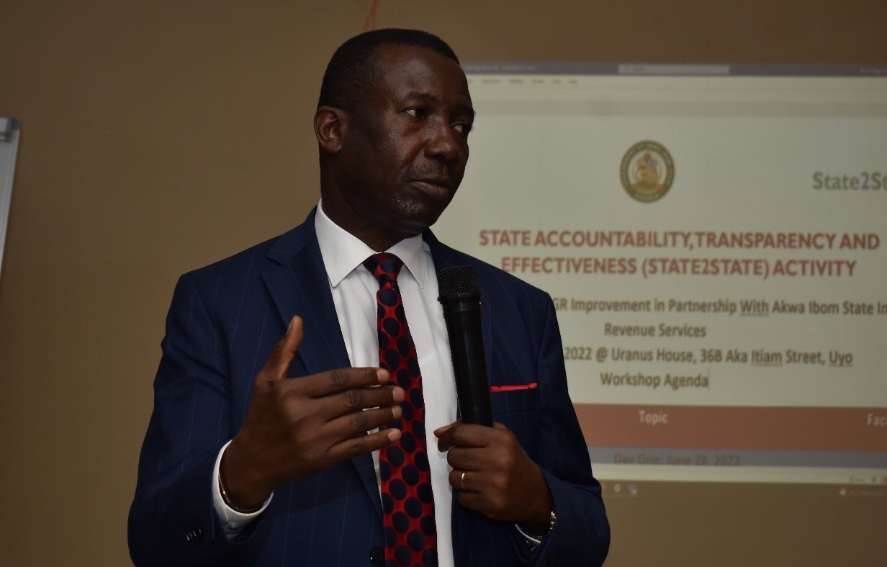 Mr. Okon Okon, Executive Chairman, Akwa Ibom Internal Revenue Service, AKIRS, speaking at a public private dialogue on improvement of IGR in Akwa Ibom State.
Mr. Okon Okon, Executive Chairman, Akwa Ibom Internal Revenue Service, AKIRS, speaking at a public private dialogue on improvement of IGR in Akwa Ibom State.
▪ Real Estate contribution to Akwa Ibom State IGR
There has been an influx of people into the state for business, leisure and residential purposes. New indigenous enterprises have sprung, old businesses have expanded. The population of the state has leaped exponentially from about 4 million according to the 2006 census figure to an estimated 7 million people. Consequently, infrastructure like roads, electricity, security, health and educational facilities have been expanded and social services like wastes management have been extended to new areas like Nung Udoe Ibesikpo, Ikot Oku Ikono, Ntak Inyang and Ikot Mbang in Itu local government area. Refuse evacuation and waste management services (solely paid for by the government) which were hitherto concentrated within the state capital have been extended up to about 7 km radius off the capital city. On face value, this shows an increase in the number of houses, estates, businesses – a growth in the real estate sector of the state. Rent has gone up exponentially. In Uyo, a-one bedroom flat (comprising a living room, one bedroom, one toilets and a kitchen) is given on average of N250,000 -N300,000, while a-2 bedroom flat goes for N400,000 – N600,000 annually. The high cost of rent can be attributable to high population growth, livability and availability of social services and infrastructure and the enduring peace made possible by the government and people of the state.
However, the sector contributes almost nothing to the state’s revenue. There is an imbalance – while the owners of commercial property smile to the bank at the beginning of a rent year, the state government bears the brunt of meeting the burgeoning social needs of the expanding real estate sector. Revenue data of 2019, 2020 and 2021 from the Ministries of Lands and Water Resources as well as Housing and Urban Renewal show that the two ministries jointly generated an average of N45.3million per quarter and an average of N300 million a year. The state’s MTEF document also shows that the real estate sector contribution to state GDP was 0.96 in 2017. The highest the sector ever contributed to the state’s GDP was 1.01 percent in 2013. The shows that the real estate sector of is largely untapped.
This is not so in other states. In Lagos, Ogun, Kaduna, Ekiti, Osun, Oyo, Edo and Anambra, land-based revenue or urban property tax contributes significantly to their IGR and GDP. For instance, in 2019, Anambra state raised N3.657 bn (as Land-based revenue) representing 14.52 % of the state’s IGR for that year.
▪ Property Tax
Property tax is not targeted at the poor. It targets the rich and wealthy. In different countries of the world including Uganda in Africa, property tax targets high net worth individuals (HNWIs). Property tax is used as a strategy for wealth redistribution. Property tax according to the Food and Agricultural Organisation is an annual tax imposed on real property usually calculated advalorem (according to the value of the property). In Nigeria, the property rate is charged annually at 0.3% for recreational property, 0.4% residential property, 0.6% for commercial property and 0.7% for Nigeria.
▪ Why Akwa Ibom Property Charge Bill 2017 failed
The Akwa Ibom state property Charge Bill 2017 failed for a number of reasons. Mr. Harry Udoh, chairman, Akwa Ibom state civil society organisations forum and the CSO representative in the state public procurement board identified some of the pitfalls.
“We weren’t sure which property was going to be taxed. We were in the forefront asking to know exactly how the government was going to go about doing that and we thought there should be a template that is transparent enough for everyone to see.”
“There were also concerns of proper accountability on the revenue that having been coming from the centre and the taxes that have been coming from the oil companies here in the state. People complained that they were not really seeing the value of that on the people and the economy and you are coming with property tax, so the people rose up that time and spoke against it.”
The property charge Bill 2017 sought to bring all property in the state under the property tax net. The Bill in section 2 (1) stated, “the charge shall be payable on ALL property, except- property owned and occupied by a religious body and used exclusively for public worships or religious education; cemeteries and burial grounds; registered institution and educational institute certified by the commissioner for finance, and property specifically exempted by the governor of the State by notice published in the State government official gazette”. The professional associations and members of the public saw this provision as an attempt to impoverish the masses, consequently, they kicked against it vehemently.
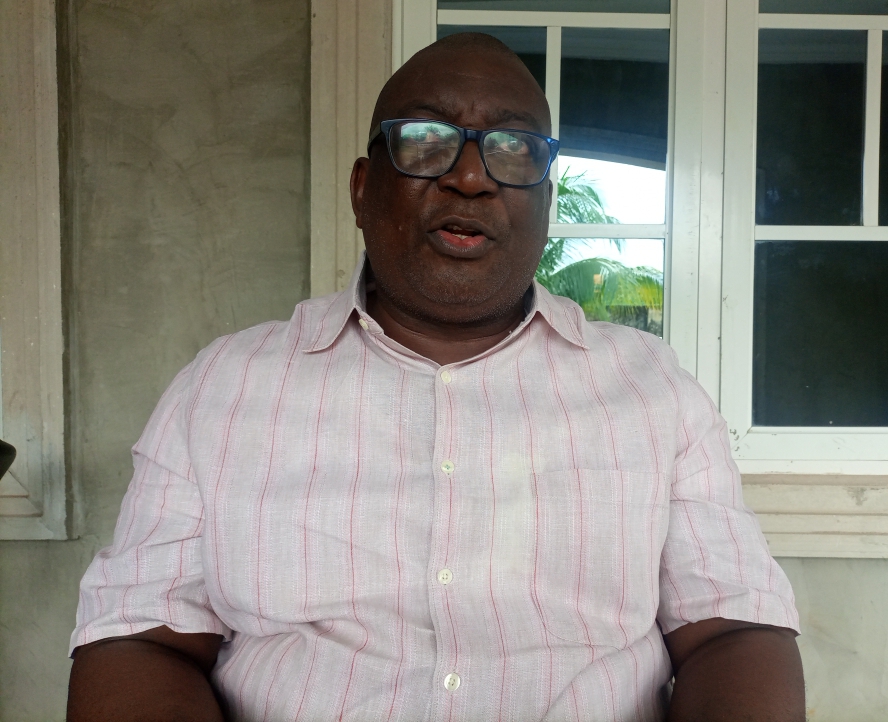 Mr. Harry Udoh, Chairman, Akwa Ibom State Civil Society Organization Forum.
Mr. Harry Udoh, Chairman, Akwa Ibom State Civil Society Organization Forum.
It could be recalled that the Nigerian Institute of Estate Surveyors and Valuers (NIESV) in the state led by Estate Surveyor U. U. Egerton, said seeking to charge ALL property was an aberration to the constitution. The institute said the “the formula of the Real Property Charge Bill was arbitrary and very very unprofessional”. The institute insisted that section 10 of the Land Use Act only permits the Governor to place charge on property that have certificate of occupancy.
There was a demand from local government councils for a clear template for the collection of the charge to ensure that their powers and rights of collection of tenement rate was not taken away. More so, public engagement on the Bill was not intensive and exhaustive, the only opportunity the public had to speak to the Bill was during the public hearing organised by the House of Assembly committee on finance and appropriations. This one off engagement did not satisfy public curiosity.
Despite the strong opposition against the Bill in 2017 from CSOs, the media, NIESV and individuals, Mr. Harry Udoh has posited that property taxation is now “necessary” in the state. He said, “if the state adheres to that SFTAS DLI 5 that shows exactly where the property is, who owns the property and what the property is being used for and all of the other details that go with that, I think then, the state would be ready for property taxation. It is necessary because with the atrophy of resources from oil, we need to look for ways and means to be able to pull enough resources to cater for the needs of the people.” However, he advised that there must be a tax-to-service-comapct, accountability and transparency in management of the revenue that will accrue from property tax.
▪ Property to be taxed?
The controversy which surrounded the demand for definition of “property” under the 2017 property charge Bill has been laid to rest in the Akwa Ibom State Revenue Administration Law, (AKSRAL) 2016. In a recent amended regulations to the AKSRAL tilted “Akwa Ibom State Sharing of Property Data Regulations, 2022” which came to effect on June 6, 2022, property is explicitly defined to mean “land, and includes houses, buildings and any fixtures that generate income or is used for the purpose of deriving income either by the owner or manager of such property.” The implication of this definition is that private residence occupied by the owner would not be taxed.
However, a non-governmental organisation, Media Action for Accountable Leadership (MAAL) has stated that the intention of the state government by this definition of property has veered off the real essence of property taxation. Acting Executive Director of the organisation, Mr. Ita Benedict, said property tax should be targeted at the very rich and wealthy for purposes of wealth redistribution. “Creating a window in this regulation to exempt high net worth residential property with access to first-grade services from electricity, to good roads, security and ambience, in highbrow estates in the state is against the key element of property taxation. Top politicians, business executives and religious leaders who own and live in these estates should not be exempted from property taxation. Struggling businesses, start-ups, and very low-income rented houses for business and residential purposes who bear the brunt of the daily economic realities should not be the only focus for property taxation. The dragnet of property taxation should cover high net worth individuals who own high premium, multi-million/multi-billion Naira worth of houses in estates such as Shelter Afrique, Ewet Housing, Osongama, other estates and upcoming ones.”
 Mr. Ita Benedict, Acting Executive Director, Media Action for Accountable Leadership.
Mr. Ita Benedict, Acting Executive Director, Media Action for Accountable Leadership.
▪ How prepared is the state for property taxation?
The Commissioner for Lands and Water Resources, Mr. Iniobong Ekong said the state is “95 percent gone” with setting up the digital infrastructure needed for land administration.
The state has digitized its land administration processes thereby reducing the time-span and hazzles involved in processing land documents and titles. The chairman, Land Use and Allocation Committee, Prof. Peter Esuh, said all pending application for C-of-O have been processed and approved. For the first time, the Governor has delegated his exclusive powers to sign C-of-O to the commissioner for lands. All these are geared towards ensuring ease of land administration, acquisition and financing in the state.
The state government is strategically constructing new roads to link up virgin areas in the urban centres where people have moved in and started building new residences. For instance, roads are being constructed and electricity taken to villages like Ifa and Mbiabong in Uyo, and Nung Ette in Ibesikpo Asutan where new settlements are springing up as extensions to Shelter Afrique. The same is done for Ewet housing extension, Akpasak Estate extension, and Osongama extension. Same is also done in urban centres like Eket, Oron, Etinan, Abak.
The government says it is intensifying effort to ensure that all communities in the state have acess to electricity and all households are connected to the national grid which is one of the world bank’s requirements for property tax. New transmission and power substations have been constructed in ONNA and Uyo. Governor Udom Emmanuel in the state’s 35th anniversary broadcast on September 23, 2022, said “out of 2,274 gazetted villages in the state, less than 5 percent is yet to be linked to the national grid”. The state has procured about 50 transformers for this purpose. In furtherance to this, the state executive council on 18th October approved the construction of a 12 Megawatt power substation at Etim Ekpo to provide electricity to Etim Ekpo, Ukanafun, Oruk Anam, Ika and its environs.
Drawing from the 2017 experience, the state government through the Akwa Ibom Internal Revenue Service, AKIRS, in collaboration with the USAID sponsored State2State project team has already commenced subliminal engagements on property taxation with taxpayers. Property tax was one of the focal points of discussion during the 2nd public private dialogue on IGR improvement held by the AKIRS in Uyo between June 28 and 29, 2022. The AKIRS has created a Joint State Revenue Committee and has been holding regular meetings with supervisors for finance, revenue committees and directors of finance from the 31 local government areas working together towards harmonisation of revenue in the state.
▪ Recommendations
It is laudable that the state government has worked really hard across MDAs to meet the baseline requirements for property taxation. However, to have the buy-in of the public this time, engagement on the Bill must be intentional and extensive. It should go beyond the ceremonial public hearing and its associated razzmatazz usually organised by the State House of Assembly. There should be multi-level engagements with landlords, CSOs, the media. Such engagement should produce the template for assessment that will form part of the property charge Bill. The government should not sit alone and set the template. An appendix to the template should be a clear graphical demarcation of the “urban” areas that would be covered under the property tax regime. Procedures for a future expansion of the areas covered under the law and time line for such expansion must be clearly spelt out.



